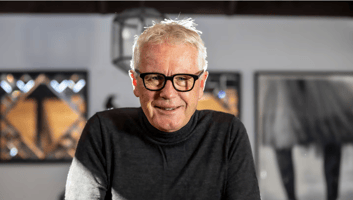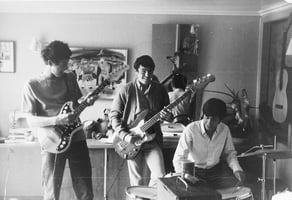Kings College invited me and Jordan Luck to be judges at one of their House Music competitions. I...
Mike's Musings: Torey Leggett & Mick Webb
The British Invasion that screamed across the planet through 1964 and onwards was and remains a popular music earthquake. In 1963, there were no pop singles that earned a spot on the USA Top 200 singles charts. In 1964, there were 34. And with this revolution, there were a number of factors that came into play. Let’s list some:
- Fashion: suits, shoes, boots, shirts, dresses, skirts and so on.
- The technology of recording pop songs.
- The songs that mirrored the new lives of teenagers where a formal advancement was abandoned and the varying wheel of a radical social tenure propelled young teenagers forward.
- The onset of cultural imagination, adventure and the future.
And it was all the result of the adventures of four Liverpudlian’s – The Beatles. We all took note and were glued to the spot. We all stood back and took to it!
When those amongst us fixated on the Beatles with a passionate embrace, we thought of the Beatles package as a unitary concept. Their songs seemed quite simple – especially compared to the Stage Musical songs that our parents had embraced. Mum and Dad took to songs like those from:
West Side Story. The King And I. Oklahoma etc.
The stages of New York and London brewed up singing, acting, dancing (choreography), sophisticated orchestral arrangements and set design. And the theaters were full.
So where did the Beatles fit in there?
Well, it’s simple in hindsight. They smashed them all through a gregarious enthusiasm and a seemingly simple musical process.
Yes?
Yes indeed!
But there was a beautiful wonder that hadn’t secured a place in the stage musicals and their drawcard patterns whereby young proponents wanted to engage and take part. It was in the playing of musical instruments and the writing of vocals to weave through the songs and their simple, yet engaging lyrics. It was a revolution. That the older generation let rest in a seemingly silent world. The potent value of playing in a rock n roll band was waiting in the wings.
Not for long.
The retail music shops that sprouted on street corners and high streets were lures that drew in young wannabes who then brought with them a yearning to unlock their musical adventures and their own sense of adventure. And they carried the keys to the locks. Did that happen in New Zealand? Indeed, it did.
And here we are in 2025, with a chain of music retailers that stands at the front of the queue. They are known as the Rockshop and their musical prowess in the nation’s cool array of instruments as wide as you could want – well they‘re there to savor.
When I first walked in, I was flabbergasted by what was available. I knew in seconds that I had access to what I needed to master the right guitar. It was on the wall, a Taylor, and it spoke to me.
‘Hey Chunnie!! Take me home.’
… and that this was the right time.
So, who were these champions? Well, the chief pioneers of Rockshop were the Co-Founder/Managing Director Mick Webb, who came in from England, and a lad who emerged in from one of the most creative hot spots in the Northern Hemisphere – Canada – and his name is Torey Leggett. He is a Rockshop Director. Both grew into the world of rock music in their own way.
Mick: “I was 13 when the Beatles broke, so from a rock n roll point of view I won lotto. All my teenage years were alongside the Beatles and all the other bands and artistes that followed in their wake. Unfortunately, in the very early 60’s the media were still very conservative and very few programs on either TV or Radio that we could see or hear the latest releases.
Our savior? Radio Luxembourg.
A commercial station that transmitted across Europe and although reception was very sketchy in the UK at least we could hear “Yeah, yeah, yeah’s through the constant interference.
Then, Nirvana!!
Pirate radio stations popped out of the ocean. First, in 1964, it was Radio Caroline followed by Radio London and many more. So, as well as an endless flow of hit songs, Pirate Radio and recently available transistor radios, we are listening to “pop music” 24/7.
And as George Harrison said : Everything was black and white until the Beatles came along and then everything turned into colour.”
Mick’s enthusiastic demeanor said it all. The powerful influence was written. And young British teenagers with dreams at hand started scouring through retail shops looking for electric guitars et al. The same thing was happening in Canada.
Torey: “There was an awareness of something happening. Toronto suddenly had big acts coming through. The Stones, Who, Led Zeppelin. Canadians were very lucky. And we were drawn in.
I started off in a marching band where I soon graduated to a little band with my brother. I was 12-13 yrs old. When we played, I was so nervous my knee hit my snare drum and the kit tumbled to the floor. Not long after, our family moved to New Zealand.”
So, was he in the right country? When I proposed that he might have found there was little interest in New Zealand in being a rock musician, Torey responded.
Torey: “Actually we found Auckland quite the opposite. We found that the musicianship and the number of musicians far outweighed the population.”
Mick’s toing and froing in New Zealand differed. Initially, he focused on Amplifier manufacturing (he had the rights to manufacture two of the UK’s top guitar brands in NZ and distribute across the South Pacific including Australia), but the prime minister of the day, Robert Muldoon, had imposed a protectionism culture which was onerous.
So, Mick and his wife Genny returned to the UK to wait until Muldoon was gone. Did that happen – yes it did – in 1984. And in 1986, the Webbs returned and the Rockshop era began with a shop on the iconic spot in Karangahape Road.
I asked Mick whether he needed import licenses. The answer? He said “No, not anymore. The new government saw to that”.
Under the previous regime pretty much anything that was brought into the country had to have an import license from the Government, as well as incurring very high duties, which is why everything was so expensive and in limited supply.
Mick’s previous 15 years’ experience in the music industry in both the UK and Germany helped build up a strong retail culture and he, Genny, Torey and the professional staff that followed carved out a work ethos that really worked. Torey emphasizes that the Rockshop maintains a ‘nurturing’ ethic based on their belief that young emerging musicians need to receive feedback and advice from retailers who have the right support structure to the mechanics of today’s essentials in their wide range of instrumentation.
It’s certainly the time to dig deep and carve out a worthwhile bedrock of musical excellence. It’s happening around us. And it’s something that is truly worthwhile.
The future of popular music is in safe hands.




